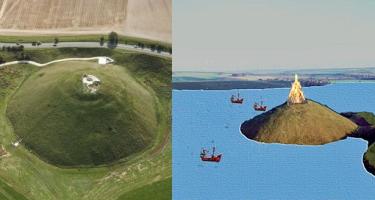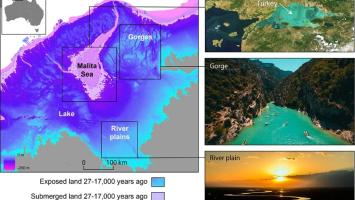Copy Link
Add to Bookmark
Report
AIList Digest Volume 5 Issue 271

AIList Digest Monday, 23 Nov 1987 Volume 5 : Issue 271
Today's Topics:
Queries - Constraint Satisfaction & Systems Developed using AI Tools/Shells,
Learning - Genetic Learning Systems & Adaptive Systems,
Expert Systems - Statistical Expert Systems & Benchmarking,
Games - Mancala Reference,
Applications - Speech Understanding,
Comments - Success of AI & Who Owns the Output of an AI?
----------------------------------------------------------------------
Date: Fri 20 Nov 87 17:27:35-CST
From: Charles Petrie <AI.PETRIE@MCC.COM>
Reply-to: Petrie@MCC.com
Subject: Constraint Satisfaction Query
Does someone know a pointer to software and algorithms that relax
constraints and reason about which to relax first? In particular,
does anyone know of a linear programming system which does not
satisfy all constraints and which allows a partial ordering on the
satisfaction of the constraints?
------------------------------
Date: 19 Nov 87 12:00:00 GMT+109:13
From: santino@esdvax.arpa
Reply-to: <santino@esdvax.arpa>
Subject: INFO REQUESTED ON SYSTEMS DEVELOPED USING AI TOOLS/SHELLS
I N T E R O F F I C E M E M O R A N D U M
Date: 19-Nov-1987 12:00
From: Fred Santino
Username: SANTINO
Dept: ESD/SCPM
Tel No: x5316
TO: _MAILER! ( _DDN[AILIST@SRI.COM] )
Subject: INFO REQUESTED ON SYSTEMS DEVELOPED USING AI TOOLS/SHELLS
1. We're interested in knowing of examples of "real world" expert
systems developed using commercially available expert system
tools/shells, particularly those which have applicability to our
present "CGADS" development, and any other information useful prior to
our selecting a tool. Some preliminary background on our "CGADS"
project is provided:
2. The Computer Generated Acquisition Document System (CGADS) is the USAF
Electronic Systems Division (ESD) first-generation expert system which
assists DOD program managers and engineers in creation of acquisition
documents such as "Statements of Work" which become part of Government
"Request For Proposals" (RFP's) for major DOD systems projects.
CGADS, presently running on a VAX 8600, is used operationally by the USAF
Electronic Systems Division, as well by a large number of other DOD
acquisition agencies nationwide. CGADS is also used at the Air Force
Institute of Technology to teach systems acquisition management.
CGADS, used equally by experienced and inexperienced engineers,
presents a series of yes/no questions, such as type of equipment,
logistics, safety, production, phase of development, and degree of
commercial off-the-shelf components. Based on the engineer's
choices, CGADS generates the proper "boiler-plate" text and MIL-STD
references to form a draft Statement of Work.
Since the system text and rules are updated periodically by experts
who represent several dozen technical disciplines, the resulting
document meets most requirements, and needs only minimum review. The
system also allows newly assigned engineers, having only minimum
training, to create draft acquisition documents.
Since CGADS was first developed in 1981 exclusively in Fortran 77, and
without using a database, it has become unnecessarily expensive to
keep the text updated. Also, its structure lacks the flexibility for
planned capabilities, such as producing the greatly varying system
specifications for major DOD acquisition programs.
3. We plan to use an ORACLE database to improve the text storage, and to
select a commercial expert system tool/shell to minimize development
of an inference engine, and maintenance utility. Some examples of
AI tools we may evaluate:
Knowledge Engineering Environment (KEE), Intellicorp, Menlo Park, CA
Knowledge Engineering System (KES), Software A&E, Arlington, VA
The Intelligent Machine Model (TIMM), Gen Research, Santa Barbara, CA
OPS5, Carnegie Mellon Univ, Pittsburgh, PA
Expert, Rutgers Univ, New Brunswick, NJ
S1 or M1, Teknowledge, Inc., Palo Alto, CA
Automated Reasoning Tool (ART), Inference Corp, Los Angeles, CA
4. We'd be interested in knowing the type of application, the amount of
programming that was required to "tailor" the commercial shell/tool
for the application, and the amount of maintenance required.
In addition to providing information on actual systems developed
using commercial tools, we'd appreciate hearing any lessons learned,
or recommendations both positive and negative that anyone is willing
to share, even "horror stories" about developments that never made it,
or products to avoid (if any).
5. Please answer on AILIST, or directly to SANTINO@ESDVAX.ARPA,
or call Autovon 478-5316, or Commercial 617-377-5316.
Thanks,
Fred Santino
Project Engineer
USAF Electronic Systems Division (ESD/SCP)
Hanscom AFB, MA 01731
------------------------------
Date: Wed, 18 Nov 87 08:42:55 est
From: John Grefenstette <gref@nrl-aic.ARPA>
Subject: Re: references for genetic learning systems
The following books give a good overview of genetic learning
systems:
Adaptation in Natural and Artificial Systems,
J. H. Holland, Univ. Michigan Press: Ann Arbor, 1975.
Induction: Processes of Inference, Learning, and Discovery,
J. H. Holland, K. J. Holyoak, R. E. Nisbett and P. A. Thagard,
MIT Press: Cambridge, 1986.
Genetic Algorithms and Simulated Annealing,
L. Davis (ed.), Pitman: London, 1987.
Genetic Algorithms and Their Applications:
Proceedings of the 2nd Intl. Conf. Genetic Algorithms,
J. J. Grefenstette (ed.), Lawrence Erlbaum Assoc: Hillsdale, 1987.
There is also a bulletin board devoted to genetic algorithms
and related topics. To join, send a request to:
GA-List-Request@NRL-AIC.ARPA
-- JJG
------------------------------
Date: Wed, 18 Nov 87 08:54:55 est
From: Lashon Booker <booker@nrl-aic.ARPA>
Subject: Re: references for adaptive systems
Ron Goldthwaite of UCalif, Davis asks
> Holland's PhD students do odd theses: adaptive control of a refinery;
> pallett-loading scheduling; other pragmatic stuff. Why?
In fact, a large number of Holland's PhD students have done theses that
are not "pragmatic" at all in the way you indicate. Here are a few examples
that come to mind:
Rosenberg, R. S. (1967) "Simulation of genetic populations with biochemical
properties", studies the evolution of populations of single-celled organisms.
Reynolds, R. G. (1979) "An adaptive computer model of the evolution of
agriculture for hunter-gatherers in the valley of Oaxaca, Mexico",
a study that explains a body of archaeological findings.
Booker, L. B. (1982) "Intelligent behavior an an adaptation to the task
environment", a computational model of cognition and learning
in simple creatures.
Perry, Z. A. (1984) "Experimental study of speciation in ecological
niche theory using genetic algorithms"
Grosso, P. B. (1985) "Computer simulation of genetic adaptation: Parallel
subcomponent interaction in a multilocus model", studies diploid
representations and explicit migration among subpopulations.
There are many other articles and tech reports of a similar nature having to do
with genetic algorithms and classifier systems. The "pragmatic stuff" seems
to be the work that is most interesting to the AI community.
Lashon Booker
booker@nrl-aic.arpa
------------------------------
Date: 19 Nov 87 22:58:22 GMT
From: eric@aragorn.cm.deakin.OZ (Eric Y.H. Tsui)
Reply-to: eric@aragorn.UUCP (Eric Y.H. Tsui)
Subject: Re: Statistical Exp. Sys. Query
In article <563694273.0.LPRESS@VENERA.ISI.EDU> LPRESS@VENERA.ISI.EDU
(Laurence I. Press) writes:
>Can anyone give me pointers to programs and/or papers on statistical
>applications of expert systems?
>
>Larry
>-------
See Artificial Intelligence and Statistics, edited by William A. Gale,
Addison-Wesley, Reading, 1986.
---------------------------------------------------------------------------
Eric Tsui >> CSNET:eric@aragorn.oz <<
Division of Comp./Maths.>> UUCP: seismo!munnari!aragorn.oz!eric <<
Deakin University >> decvax!mulga!aragorn.oz!eric <<
Victoria 3217 >> ARPA: munnari!aragorn.oz!eric@seismo.arpa <<
Australia >> decvax!mulga!aragorn.oz!eric@Berkeley <<
------------------------------
Date: 19 Nov 87 23:03:27 GMT
From: eric@aragorn.cm.deakin.OZ (Eric Y.H. Tsui)
Reply-to: eric@aragorn.UUCP (Eric Y.H. Tsui)
Subject: Re: Exp. Sys. Benchmarking Query
In article <563694555.0.LPRESS@VENERA.ISI.EDU> LPRESS@VENERA.ISI.EDU
(Laurence I. Press) writes:
>Can anyone supply pointers to papers on benchmarking and performance
>evaluation for expert system shells?
>
>I have written a short program that generates stylized rule bases of
>a specified length and have used it to generate comparative test cases
>for PC Plus and M1. I'd be happy to give anyone a copy and would like
>to learn of other efforts to compare expert system shells.
>
>Larry
>-------
On evaluation of Expert System tools, see J.F. Gilmore, K. Pulaski
and C. Howard, A Comprehensive evaluation of expert system tools,
Applications of AI III, J.F. Gilmore, Editor, Proc. 635, p2-16.
(The above group has published a few papers on the evaluation of ES
and the above paper is only a recent one of many from them.)
---------------------------------------------------------------------------
Eric Tsui >> CSNET:eric@aragorn.oz <<
Division of Comp./Maths.>> UUCP: seismo!munnari!aragorn.oz!eric <<
Deakin University >> decvax!mulga!aragorn.oz!eric <<
Victoria 3217 >> ARPA: munnari!aragorn.oz!eric@seismo.arpa <<
Australia >> decvax!mulga!aragorn.oz!eric@Berkeley <<
------------------------------
Date: 18 Nov 87 14:27:22 GMT
From: uvaarpa!virginia!uvacs!dsr@umd5.umd.edu (Dana S. Richards)
Subject: Re: AI gaming : mancala
>In article <542@mit-caf.UUCP> jtkung@mit-caf.UUCP (Joseph Kung) writes:
>>Anybody out there have any interesting gaming strategies for the
>>African game, mancala? I need some for an AI game that a friend of
>>mine is working on. Thanks.
There is a book "Mancala Games" by Laurence Russ, Reference Publ. Inc., 1984.
I haver not read it but it was reviewed in Math. Intelligencer 9(1987)68.
------------------------------
Date: 18 Nov 87 10:25:00 GMT
From: uxc.cso.uiuc.edu!osiris.cso.uiuc.edu!goldfain@a.cs.uiuc.edu
Subject: Re: Practical effects of AI (speech
I would like to echo the sentiment in Eric Green's comment.
Let us NOT try to define AI in terms of techniques. It is defined by its
domain of inquiry, and that clearly includes speech recognition. I do not for
a moment believe that continuous speaker-independent speech recognition,
if/when it is achieved, will be considered primarily a work of physics. No
matter how it is achieved, that is just not a viable statement.
- Mark Goldfain
------------------------------
Date: 16 Nov 87 17:43:50 GMT
From: PT.CS.CMU.EDU!SPEECH2.CS.CMU.EDU!kfl@cs.rochester.edu (Kai-Fu
Lee)
Subject: Re: Practical effects of AI (speech)
In article <244@usl-pc.UUCP>, jpdres10@usl-pc.UUCP (Green Eric Lee) writes:
> But seriously, considering that sciences such as physics and
> mathematics have been ongoing for centuries, can we REALLY say that AI
> has "traditional techniques"? . . . "it is far from clear that it
> would be an advancement for AI" presupposes that one defines AI as
> "that science which uses certain traditional methods", which, I
> submit, is false.
>
By "traditional techniques", I was referring to the older popular
techniques in AI, such as expert systems, predicate calculus, semantic
networks, etc. Also, I was trying to exclude neural networks,
which may be promising for speech recognition. I have heard of
"traditionalist vs. connectionist AI", and that is why I used the
term "traditional techniques".
Kai-Fu Lee
Computer Science Dept.
Carnegie-Mellon University
P.S. - I did not say that AI is a science.
------------------------------
Date: 15 Nov 87 13:56:12 GMT
From: eitan%WISDOM.BITNET@wiscvm.wisc.edu (Eitan Shterenbaum)
Reply-to: eitan%H@wiscvm.arpa (Eitan Shterenbaum)
Subject: Re: Success of AI
In article <> honavar@speedy.wisc.edu (A Buggy AI Program) writes:
>
>In article <4357@wisdom.BITNET> eitan%H@wiscvm.arpa (Eitan Shterenbaum) writes:
>>
>>Anyway, no one can emulate a system which has no specifications.
>>if the neuro-biologists would present them then you'd have something to start
>>with.
>
> I use the term "computer" in a sense somewhat broader than a
> Von-Neuman machine. We can, in principle, build machines that
^^^^^^^^^^^^
^^^^^^^^^^^^
> incorporate distributed representations, processing and control.
> It is not clear what you mean by a "distributed environment lacking
> boolean algebra."
> The use of fine-grained distributed representations naturally results
> in behavior indicative of processes using fuzzy or probabilistic logic.
> The goal is, not necessarily to emulate the brain in all its detail:
> We can study birds to understand the principles of aerodynamics that
> explain the phenomenon of flying and then go on to build an aeroplane
> that is very different from a bird but still obeys the same laws of
> physics. As for specifications, they can be provided in different
> forms and at different levels of detail; Part of the exercise is
> to discover such specifications - either by studying actual existing
> systems or by analyzing the functions needed at an abstract level to
> determine the basic building blocks and how they are to be put
> together.
>
a) You can't understand the laws under which a system works without
understanding the structure of the system ( I believe that our
intelligence is the result of our brain's structure )
b) The earodynamics example just prooves my point. Only after understanding
*WHY* the birds are built in a certain form the researchers would've
been able to understand the pronciples. The fact is that Leonardo de Vinci
knew more about aerodynamics than the pioneers of flight is acknowlodged
to the *research* he has done on birds. It seems to me that many AI
scientists disregard 2 facts a- They have no definition of AI
b- They disregard the fact that the best
way to have more knowledge about a certain
phenomennon is to observe and research it.
It seems to me that
1) You have no definition for Intelligence.
2) You want to have the rules of Itelligence.
3) Thus you build systems inorder to simulate Intelligence.
4) Since you don't know you're looking for and since you have no
basic rules to simulate the intelligence on, you invent your
own local definition and rules for Intelligence.
5) Then youtry to mach your results with your expectations of what
the results should be.
Sometimes it works some time it doesn't.
This method reminds me "random sort" I.E The computer has N numbers, It
randomly prints them out one by one and then it tries to check whether
they are ordered, if not - he does the above again. I hope that you've
noticed that the probability that you'd be correct is quite slime
( actually 1/N! ... )
>>
>>And last - Computers aren't meta-capable machines they have constraints,
>> not every problem has an answer and not every answermakes sense,
>> NP problems are the best example.
>>
> Are you implying that humans are "meta-capable" - whatever that means?
>
I'm trying to imply that human beings aren't Turing equivalent ...
( not even when compared to a non-determinitstic turing machine )
Correct me if I'm wrong but I do feel that the neuro-biologists chaps are
in the right track and that the Computer scientists should combine efforts
with them instead of messing around with AI.
(I'm not saying that AI isn't usefull, it is, just that it's very little
success in Inteligence and a grand success in Artificial artifacts ...)
Eitan Shterenbaum
Disclaimer - My ideas are mine and only mine !
@@@@@@@@@@@@@@@@@@@@@@@@@@@@
------------------------------
Date: 18 Nov 87 09:55:00 GMT
From: uxc.cso.uiuc.edu!osiris.cso.uiuc.edu!goldfain@a.cs.uiuc.edu
Subject: Re: Who owns the output of an AI?
Just to fan the flames, let me throw in 1 totally outlandish, 2 mildly
outlandish answers and a 4th that is not so bad (but I'm not sure whether I
buy the analogy.)
+-+-+-+-+-+-+-+-+-+-+-+-+-+-+
1) Newsflash. Microsoft today filed lawsuit against 250,000 authors of
various books and papers for violation of copyright. Said a Microsoft
spokesman, "Yes, these people really wrote the manuscripts, but then they
gave them, in very raw form, to our program which then took it upon itself
to edit, layout, and publish them. Our program actually owns the copy
rights to these items." When asked how his company managed to file a
quarter of a million legal documents in one day, the spokesman said "No
trouble, we just used Think Technology's 'legal councillor' program." A
second later, the Microsoft representative ran from the room muttering "Oh
no ..."
+-+-+-+-+-+-+-+-+-+-+-+-+-+-+
2) If the computer program is not intelligent enough to reply to the "raw"
data with :
"I don't know, nothing looks interesting here ..."
then to phone its author and say
"Hey Jaime, this formula makes a wonderful superconductor.
Do you want it, or should I tell Tom? "
then I doubt it has enough intelligence to "deserve" the credit itself.
+-+-+-+-+-+-+-+-+-+-+-+-+-+-+
3) In today's environment the user can shut off the machine and go get the
patent himself, claiming to have made the discovery without any computer
assistance. (Those who believe "an unenforceable law should not be a law"
may see some point in this.)
+-+-+-+-+-+-+-+-+-+-+-+-+-+-+
4) The user can claim "I did not ask the machine to find me a good
superconductor. All I asked it was whether this particular math problem
had a solution. The analogy leads us to the conclusion that we should give
credit to the author for a math theorem (and he probably already has that
credit in the literature), credit to the program for applying the theorem
to solve a particular math problem (usually quite technically difficult but
quite uninteresting to humans) and to the user for having applied the
solution of a math problem to discovery of a new superconductor.
+-+-+-+-+-+-+-+-+-+-+-+-+-+-+
Mark Goldfain arpa: goldfain@osiris.cso.uiuc.edu
US Mail: Mark Goldfain
(just a student in the) --> Department of Computer Science
1304 West Springfield Avenue
Urbana, Illinois 61801
------------------------------
End of AIList Digest
********************





























